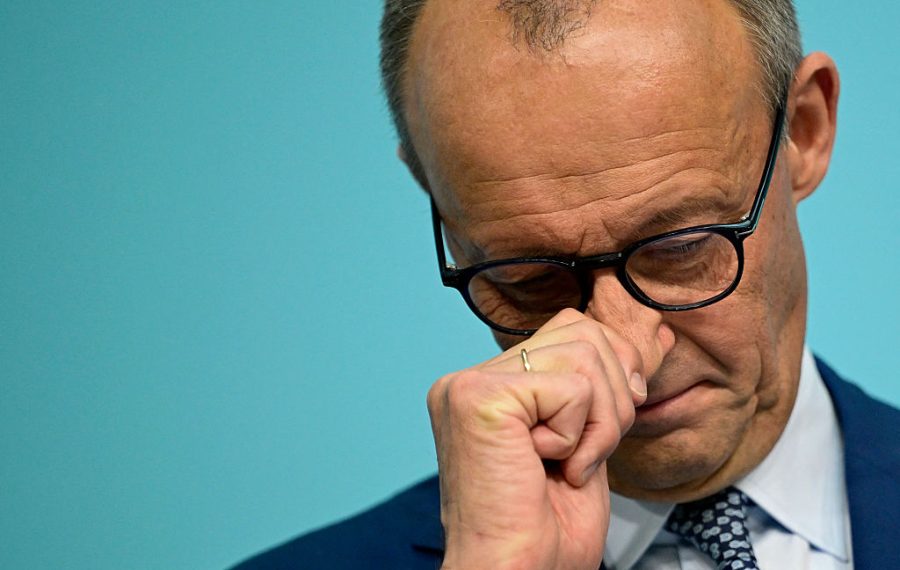As Germany braces for economic hardship and the mounting danger of confrontation with Russia, its leaders appear preoccupied with the wrong battle. The coalition government, the social democratic SPD party, and even Chancellor Friedrich Merz seem more intent on finding ways to muzzle the AfD party than on facing the realities before them. Yet none of them has the slightest notion of how to succeed. Their so-called strategy has descended into farce – a self-inflicted culture war that barely exists.
It is clear: the handling of the AfD by Germany’s centre political parties and the media is a disaster of historic proportions. Precisely because it is not an accident, not collateral damage – but a self-inflicted fiasco. The mainstream parties have spent years convincing themselves that moral outrage and ritual denunciations would stop the far right. Instead, they have turned the AfD into the most effective protest machine in modern German politics.
Friedrich Merz was once the conservative hope after Olaf Scholz’s disastrous stretch as chancellor came to an end earlier this year. Merz would be the man who promised to restore reason to a disoriented political landscape. Yet he now flounders in the same swamp that swallowed his predecessors. His grand plan to defeat the AfD is, in essence, to repeat what has already failed for a decade: louder condemnation, sharper moral lines, and the illusion that posture is a substitute for policy.
The AfD’s rise is the product of a profound failure of the political mainstream
Merz’s remarks two weeks ago about changes in Germany’s ‘Stadtbild’ – the visible transformation of cities through migration – were seized upon by the Greens as proof of bigotry. Speaking during a visit to Brandenburg, Merz said ‘we still have this problem in the cityscape, and that’s why the Federal Minister of the Interior is now in the process of enabling and carrying out returns on a very large scale’.
This lead to another useless demonstration of the all-white Matcha-Latte-drinking class. Green party leader Franziska Brantner accused him of attacking millions of Germans, while party colleagues portrayed him as an enabler of extremism. Measured against what he actually said, the hysteria was absurd. He merely observed that public spaces are changing and that deportations of those without asylum rights are necessary. That is not hate speech – it is the reality most Germans recognise.
When Merz told a journalist, ‘Ask your children, your daughters, your friends – everyone knows this is a problem, at least after dark,’ the reaction from the left was outrage. Yet many Germans, especially women who no longer feel safe in their own cities, knew exactly what he meant. Denying such experiences has become a political reflex. In Munich, three-quarters of young women already avoid public transport at night; a quarter report harassment. These are not far-right talking points. They are facts. But in Germany’s moral climate, realism has become heresy.
The bitter pill to swallow is that the CDU party, under Merz, has no strategy. It has lost itself in endless debates about boundaries instead of delivering the policy shift it once promised. Instead of leading, it manages the so-called ‘Brandmauer’ or ‘firewall’, behind which the mainstream parties have metaphorically quarantined the AfD, refusing to collaborate with them on policy or in government. Instead of winning voters, the CDU throws them over the wall, terrified of offending coalition sensitivities. Merz’s policies exist in press conferences, not in practice. His party governs headlines, not realities. As historian Andreas Rödder notes, Merz is fighting a vision of Germany that no longer exists while the electorate faces the one that does.
The SPD is faring no better. It is hollow, frightened, rudderless. For years it has ignored its traditional base – not by oversight but by arrogance. The result is predictable: those voters are leaving for the AfD, not in confusion but in clarity. They know the SPD no longer represents them. Instead of asking why, the party insults the defectors and loses more ground with every poll. The Greens, meanwhile, live in a sense of moral superiority, as though they were the last democratic force in the universe. They regularly mobilise against a rival that commands twice their support, with the applause of media allies in the main national TV stations, who have turned outrage into an industry. Together they have created the exact atmosphere in which the AfD thrives.
The liberal FDP remains, in theory, the only party capable of offering a credible narrative to lure disillusioned AfD voters back into the democratic fold. Yet that would demand a decisive break from their current path of timid conformity – and the courage to rediscover a truly liberal backbone.
The media have played their part too. For years, they have not merely criticised the AfD but demonised it – not for what it says, but for daring to exist. That contempt has long transferred to its voters. Millions now feel not challenged but despised. They turn away, seek refuge in alternative media, build digital fortresses of resentment, and reinforce one another. Every time a new Brandmauer debate erupts across the republic, the establishment feigns surprise at the AfD’s growth. But the reason is simple: in a culture where it has become fashionable to be among the excluded, condemnation is recruitment.
The AfD’s rise is not the product of an unstoppable ideology or a great political idea but of a profound failure of the political mainstream. The CDU manages its moral fences, the SPD has abandoned its people, the Greens preach rather than persuade, the FDP dithers, and the media have replaced analysis with moral theatre. In that vacuum, the AfD is prospering – not because it is strong, but because its opponents are weak.
Friedrich Merz alone cannot stop this. Nor can editorials from Berlin and Hamburg, or the next round of televised outrage. What might slow it is honesty: the willingness to face what citizens already know: that crime, integration, and insecurity are real problems, and that lecturing those who notice them only deepens the divide. Politicians like the Green politician Cem Özdemir, who has acknowledged the ‘unbearable conditions’ in city centres, show that empathy and realism can coexist. The tragedy is that such candour has become exceptional.
Germany does not need more moral outrage. It needs truth. The far right thrives not because of what Merz says, but because others refuse to say what everyone sees. Unless the left, the media, and the self-anointed guardians of democracy rediscover honesty, they will keep creating the very monster they claim to be fighting. The AfD’s rise is not destiny – but it cannot be stopped by slogans, taboos, or denial. Only by reclaiming reality itself.







Comments